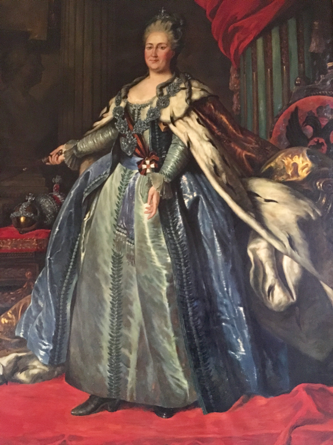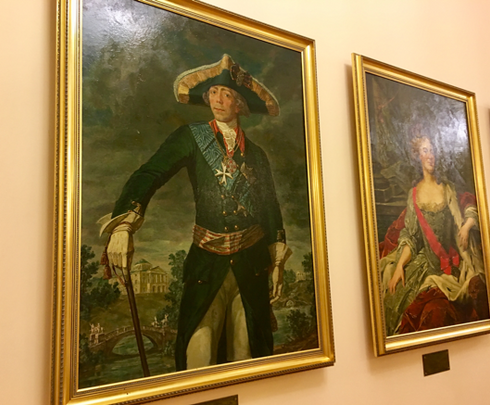From Fake News to Climate Crisis: Whom Do We Trust 2019
- Evelyn Messinger

- Sep 21, 2019
- 3 min read
CATCHING UP ON 2019
It’s been a bit more than a year since I last wrote on these pages, as the Whom Do You Trust 2018 conference was wrapping up. But it seems to be a different era.
Catherine the Great, other Czars and Czarinas, adorn the walls of Herzen Russian State Pedagogical University
SEPTEMBER 20, 2019 - ST. PETERSBURG, RUSSIA
Every night now, the temperature dips close to freezing. We Americans are over the shock of saying the words “President Trump,” but newly amazed that we could breeze into Russia with no more than the usual airport hassles - the filling out of poorly copied forms with nearly indecipherable questions, the snarling security guards - seem to have evaporated in one year’s time. The organizers are the same, Americans from Track Two and Esalen Institute, and Russians from Herzen Russian State Pedagogical University, an older crowd glad to see each other again. But most of the early 20-something students, 25 Russians and 19 Americans, are new to our gathering.

Dulce Murphy (President and Found of Track Two: An Institute for Citizen Diplomacy) and Dr. Valerii M. Monakhov (Associate Professor, Chairperson. Founder and originator of the first Institute of Liberal Arts and Sciences in Russia )
And our themes are new. Still peering at the present and the future through the lens of trust, while casting a wary eye at the effects of media on our souls and psyches, we focus this year on topics the students have identified as dangerous: climate and environment; migration and immigration; nuclear proliferation; and cyber threats. In the coming days I will be offering a few highlights of the events and the people, including short videos (hopefully!) of interviews with the wise ones, young and old...
CLIMATE CRISIS: OUR ST. PETERSBURG ACCORD
Our host Dr. Valeriy M. Monakhov, Associate Professor, Chairperson, Founder and originator of the first Institute of Liberal Arts and Sciences in Russia, said in his kick-off speech, “our capacity for reason is now challenged,” as he pointed to a book named “Liquid Reality.” True, but among these scholars and students, most of whom are fluent in English and Russian, accord is easy to find on at least one reality: climate change is real.
"People do even what you think is impossible"
With no one dissenting, Masha Vorontsova of the International Fund for Animal Welfare was able to give the gathered group some tips on how to accomplish big goals. “People do even what you think is impossible,” she commented. Using her successful campaign to ban the clubbing of baby Harp Seals as a guide, she advised us to “find the target who can make it happen,” and then be 100% prepared to go for it. With social networks, memes, stickers and tee-shirts all in play, the IFAW was able to persuade Russian President Putin - a person who can make it happen if anyone can – to ban the cruel clubbing of these adorable creatures.

Photo: BBC
The participants then broke into small groups and hashed out possible responses to climate change – or what Anastasia Uglanova, a student at St. Petersburg State University, called the climate crisis.
Here are highlights of their conclusions:
An “Overconsumption Toolkit,” envisioned as a website that tackles those twin curses, wasting way too much stuff in the process of laying the environment to waste.
Organizing a movement that starts with educating young children about climate and environment (a practice virtually absent in Russia, and in many parts of the US), accompanied by clothing swaps, social media outlets and other fine touches.
Supporting the #FridaysForFutrue campaign, apparently a Russian spin-off of the worldwide School Strike movement.
Restoring Lake Baikal, a once-gigantic lake now brought low (low water that is) by overuse.
Many groups had similar ideas, such as working with business interests to address overproduction and the mass production of plastics, exploring who should pay for clean up and for carbon taxes, and making recycling work. My favorite comment was, “make sustainability sexy.”

Russian and American students discuss possible responses to climate change at Whom Do We Trust 2019.

A student presents her group's ideas at Whom Do We Trust 2019

Evelyn Messinger is an advisor to Track Two and Executive Director of CitizensChannel. Today she is engaged in the development of a television feature series on climate change and energy alternatives, This Planet.
Read more of Evelyn's reflections on her work with Track Two here.









